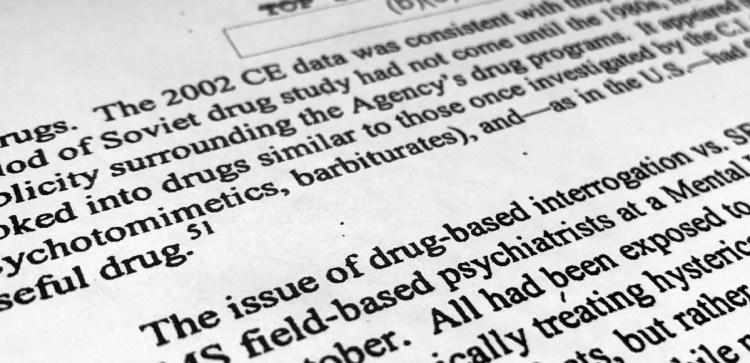WASHINGTON — Shortly after 9/11, the CIA considered using a drug it thought might work like a truth serum and force terror suspects to give up information about potential attacks.
After months of research, the agency decided that a drug called Versed, a sedative often prescribed to reduce anxiety, was “possibly worth a try.” But in the end, the CIA decided not to ask government lawyers to approve its use.
The existence of the drug research program – dubbed “Project Medication” – is disclosed in a once-classified report that was provided to the American Civil Liberties Union under a judge’s order and was released by the organization Tuesday.
The 90-page CIA report, which was provided in advance to the Associated Press, is a window into the internal struggle that medical personnel working in the agency’s detention and harsh interrogation program faced in reconciling their professional ethics with the chance to save lives by preventing future attacks.
“This document tells an essential part of the story of how it was that the CIA came to torture prisoners against the law and helps prevent it from happening again,” said ACLU attorney Dror Ladin.
Between 2002 and 2007, CIA doctors, psychologists, physician assistants and nurses were directly involved in the interrogation program, the report said. They evaluated, monitored and cared for 97 detainees in 10 secret CIA facilities abroad and accompanied detainees on more than 100 flights.
The CIA ultimately decided against asking the Justice Department to approve drug-assisted interrogations, sparing CIA doctors “some significant ethical concerns,” the report said. It had taken months for the Justice Department to sign off on brutal interrogation tactics, including sleep deprivation, confinement in small spaces and the simulated drowning technique known as waterboarding. The CIA’s counterterrorism team “did not want to raise another issue with the Department of Justice,” the report said.
Versed is a brand name for the sedative midazolam, used since the late 1970s and today sold commonly as a generic.
It causes drowsiness and relieves anxiety and agitation. It also can temporarily impair memory, and often is used for minor surgery or medical procedures such as colonoscopies that require sedation but not full-blown anesthesia.
The CIA had no comment on the report’s release, but government lawyers emphasized in a court filing in the case early last year that the report, expressly marked “draft,” was just one agency officer’s impressions of the detention and interrogation program. The ACLU spent more than two years in court trying to get the report released. In 2017, a federal judge ordered the CIA to release it.
Send questions/comments to the editors.



Success. Please wait for the page to reload. If the page does not reload within 5 seconds, please refresh the page.
Enter your email and password to access comments.
Hi, to comment on stories you must . This profile is in addition to your subscription and website login.
Already have a commenting profile? .
Invalid username/password.
Please check your email to confirm and complete your registration.
Only subscribers are eligible to post comments. Please subscribe or login first for digital access. Here’s why.
Use the form below to reset your password. When you've submitted your account email, we will send an email with a reset code.